
An Iowa town of fewer than 2,000 people is now home to a good-old-fashioned newspaper war and Tyler Anderson is smack-dab in the middle of it.
Anderson is the managing editor of the Calhoun County Phoenix, a Lake City-based newspaper that will put out its first physical issue this week. Anderson is also the former managing editor of crosstown rival the Lake City Graphic-Advocate, which will put out its 763rd issue this week.
So why does Lake City, a town with a population of about 1,700 and that boasts the charming slogan of “Everything but a Lake,” have two newspapers in an era where more print publications are shuttering than opening?
The main reason is that no one can agree on who actually owns the Lake City Graphic-Advocate.
The 122-year-old paper’s future was called into question earlier this year by Hampton-based Mid-America Publishing, one of the paper’s proclaimed owners. Mid-America acquired the Lake City Advocate and the Lake City Graphic in 2007 and eventually consolidated the two publications into the Graphic-Advocate. The company publishes about two dozen community weeklies in Iowa.
In April, Mid-America CEO Matt Grohe said he was going to close the Graphic-Advocate and put out the last issue on May 4. Grohe relayed the Graphic-Advocate news to Anderson, who had moved back from Texas in 2019 to lead the paper, in a text message.
Anderson grew up in the area and has a deep affection and sense of loyalty for Lake City and the Graphic-Advocate. He publicly shared the news of the paper’s pending demise in an attempt to save the local institution.
“It’s one thing to say, ‘Hey, I’m going to move you somewhere else,’ or, ‘Hey, I’m going to let you go,’ but it’s another thing to say, ‘Hey, I’m going to close down this newspaper,’” Anderson told Starting Line. “So it cost me my job.”
Anderson’s April 12 Facebook post included a screenshot of the texts from Grohe.
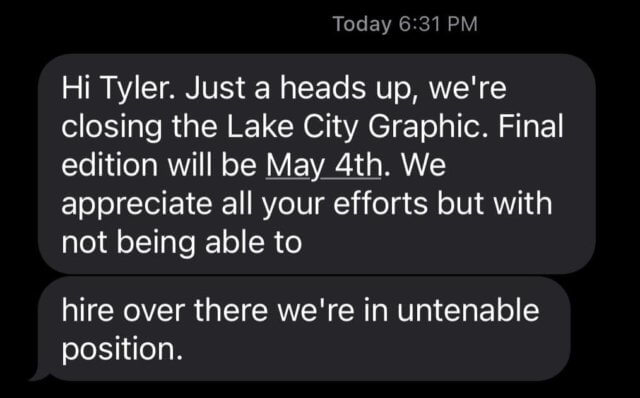
According to Anderson, Grohe forced him to sign a document he wasn’t given enough time to review, which he was then accused of breaking. This supposed violation led Grohe to suspend him.
This all took place during Holy Week, and by Friday, April 15, Anderson was let go.
“So Good Friday was not a Good Friday,” Anderson quipped.
In an interview with Starting Line, Grohe said that the conversation should have never been leaked and that it compromised a potential deal he had in place to sell the paper.
“It really complicated the transference of this paper,” he said.
Hasn’t made money for years
Two weeks after Anderson shared the texts, Grohe took to the Graphic-Adovate’s Facebook page to tell readers the paper was losing money and he couldn’t guarantee its future.
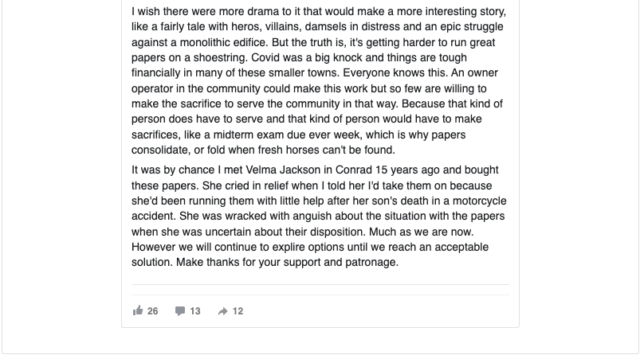
“We’re very thankful for everyone’s efforts and support over the years which have made the paper what it is today,” Grohe wrote on April 26. “Unfortunately awards don’t pay the bills, and the revenues we’ve been able to generate, even with a full staff, have not been sufficient to cover expenses.
“The paper hasn’t made money for years. Last year wasn’t so bad, it only lost $18,000, but it’s on track [to] lose more this year, so we’re exploring options.It is a business after all.”
Grohe also went on to say he is willing to sell it and thinks an owner-operator in the community could make it work.
“I wish there were more drama to it that would make a more interesting story, like a fairy tale with heroes, villains, damsels in distress and an epic struggle against a monolithic edifice,” he wrote. “But the truth is, it’s getting harder to run great papers on a shoestring.”
The post generated some sympathetic comments and a number of negative comments from readers, including more than a few from people who disliked how Grohe treated Anderson.
One of the more positive comments came from Nelson Media Co. Owner Chris Nelson, who expressed interest in buying the paper. Nelson, a former TV meteorologist who created his media company in 2020, wanted to get into community newspapers.
“Matt—you know I would love to take this challenge on for the people of Lake City, Iowa,” he wrote. “Let’s make a deal that makes sense for the community. This newspaper is bigger than both you and me, it’s such an important piece for them as citizens to remain getting their local news.”
New owner?
About a month after the April 26 post, the paper was sold, but not to Nelson.
The Breitsprecher family of Dayton—the then-owners and operators of the Dayton Leader, which has since been sold to Nelson Media Co.—took over the Graphic-Advocate.
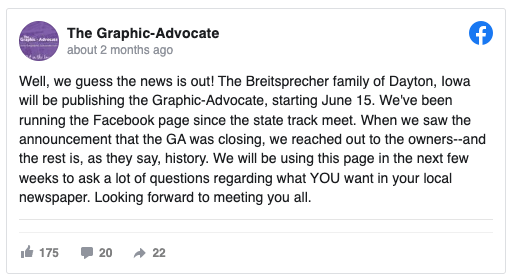
Grohe said the Breitsprechers, Nelson Media, and a third undisclosed buyer were all in the mix to buy the Graphic-Advocate. One of the reasons the Graphic-Advocate holds value is that it is considered a paper of record for multiple Calhoun County governmental entities, all of which pay to have their legal notices published in it.
Grohe said he thought the Breitsprechers would be the best fit and he knew them well since his company printed the Dayton Leader.
According to Anderson, Grohe agreed to sell the paper to the Breitsprechers for $1 and a month of free printing, but he didn’t entirely hand over the reins of the operation to them. This included withholding access to the Graphic-Advocate’s social media accounts.
“They kind of ran things for about four weeks,” Anderson said.
Grohe didn’t specify a sale price but noted the deal did include free printing.
Anderson said he helped the Breitsprechers with the Graphic-Advocate, working without pay, all the while trying to get them to consider including Nelson, who he had remained in contact with, in on the deal.
The lobbying seemed to pay off.
Nelson Media Co. announced on June 30 it had acquired the Graphic-Advocate from the Breitsprechers.
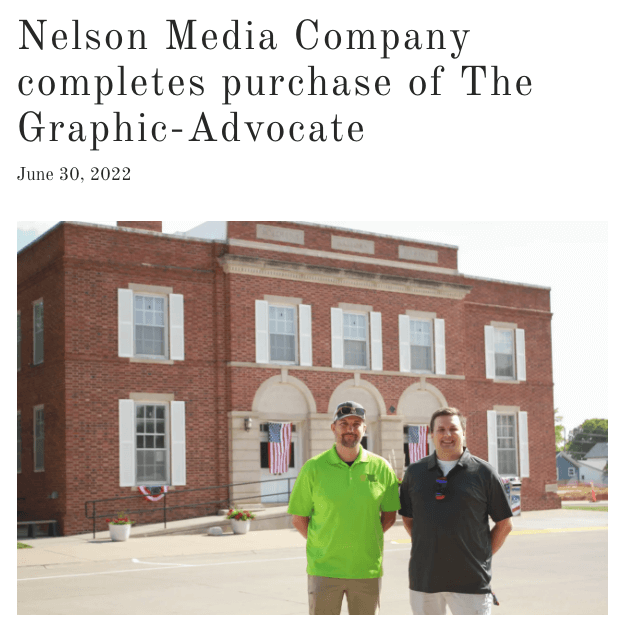
Grohe said he found out about the deal while reading a copy of the Graphic-Advocate in which it was announced. This led him to call Kendra Breitsprecher, founder and now former owner of the Dayton Leader. According to his recollection of the conversation, Grohe said he told Breitsprecher she couldn’t sell the paper since their deal wasn’t done and he compared it to a real estate transaction (Grohe is also a licensed real estate agent).
“You go to buy a house, you have buyer, seller, and then you have an offer,” Grohe said. “You work through all these contingencies and then you have a closing. So during the escrow period, you can do lots of inspections, you can bring people over to the property, you may even have an interim occupancy agreement where you can live in the property until you close, but one thing you can’t do is sell the house.”
Grohe also explained his view publicly in a July 8 post on the City of Lake City’s Facebook page.
“Unfortunately, we have to report that talks and efforts to sell the paper to both The Dayton Leader and Nelson Media have fallen through as of July 7th and Mid-America has not transferred its ownership, rights, trademarks or copyrights in The Graphic-Advocate,” Grohe wrote.
“We will continue to publish, print and file postal reports for the paper as we have done continuously since 2007 until such time as a sale can be completed,” he continued. “Other parties that have claimed ownership were served cease and desist letters on July 7th and asked to stop identifying themselves as being affiliated with or owning The Graphic-Advocate, to not accept further submissions and to desist from unauthorized use of our name and trademarks.”
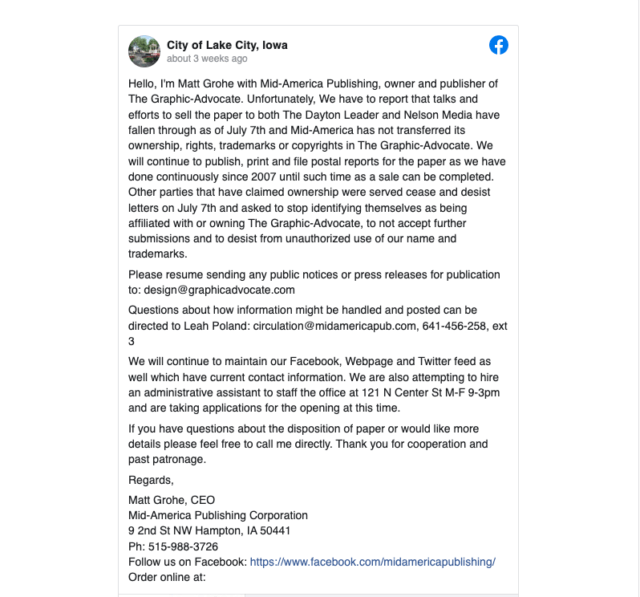
Nelson disputed this and claimed ownership of the Graphic-Advocate, and the two sides went back and forth on social media about who really owned the publication.
Additionally, for a brief period, there were two versions of the Graphic-Advocate’s website, Facebook, and Twitter pages.
This situation culminated on the week of July 10, when two issues of the Graphic Advocate came out. The July 13 issue was produced by MidAmerican Publishing staff from its other properties, and the July 14 issue was put out by Nelson and Anderson.
“It was a really good one,” Anderson said of the Nelson Media edition. “Had a really nice feature story, some really good local stuff and everything and then [Grohe] kind of blocked our ability to mail it out.”
Grohe outsourced production of the Graphic-Advocate—reporting, ad sales, design, circulation issues, etc.—to staff members at other MidAmerican properties.
One thought came to Anderson’s mind when he saw both issues.
“You know, like the Spider-Man meme where you point at one another,” he said.
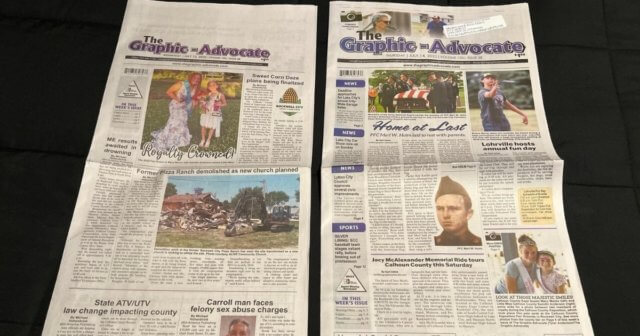
Ellie Jackson, whose family sold the Graphic and Advocate newspapers to Mid-America Publishing in 2007, questioned Grohe on Facebook as to why he seemed so adamant about fighting for the publication after previously dismissing it.
“All I can see is that you were done publishing the paper and left the readers in the lurch, but once someone else actually *wanted* to keep publishing it, you changed your minds and started acting like the villains in a Hallmark movie,” she wrote.
Grohe told Starting Line he presented Nelson multiple opportunities to buy the Graphic-Advocate—Anderson said Grohe made unreasonable requests in those offers—but without a deal in place, MidAmerica plans to continue publishing the Graphic-Advocate.
“We do have another person interested in purchasing the paper, but this is now a stigmatized property,” Grohe said. “I think if somebody felt like they have good intentions with this newspaper and then they embarked on this course of action and publicized this whole thing and got everybody in the county worked up, they’re mistaken.
“I don’t feel like this was an effective way to transfer the ownership or the management of this paper to another party, which would have been done peacefully without all this hoopla. Now it’s like a circus.”
A Phoenix rises
Nelson and Anderson got tired of bickering with Grohe and decided to do the next best thing if they couldn’t put out the Graphic-Advocate: Compete with it.
Anderson sat down with his team and fleshed out the concept for the Calhoun County Phoenix, a Nelson Media-owned publication that would also be based in Lake City.
The new paper’s name was chosen very purposefully by Anderson.
“The Phoenix. Like the bird rising from a Dumpster fire,” he said. “We didn’t include the Dumpster in the logo.”
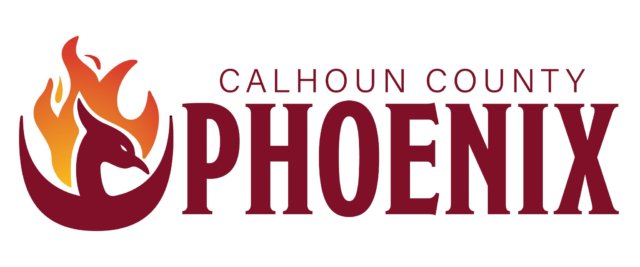
The Calhoun County Phoenix’s website went online on July 26 and the first print issue comes out on Aug. 4. Anderson and staff have been hosting pop-up events in Calhoun County to get subscribers and they set up temporary shop in the Lake City Community building.
“A lot of people are filtering into the community building and just kind of showing their support, and it’s fantastic,” Anderson said.
This outcome is a great relief to Anderson. Since April, he has been suspended and fired from the Graphic-Advocate by one owner, worked freelance for another owner, and was rehired by a third owner only to have to help start an entirely new newspaper to compete with the publication.
Anderson said he had opportunities to leave Lake City and get a job elsewhere during all of this, but he couldn’t bring himself to leave the community. He likes the people in the area and he wanted to see how things shook out.
“This part of the world just holds a special place in my heart,” Anderson said.
The managing editor, who works with a team of four people including some fellow former Graphic-Advocate staffers to put out each issue of the Phoenix, said that he and everyone else close to the situation is more than ready to move on.
“I’ve probably had more drama in the last three-and-a-half months than I did the first three years since I came back from Texas,” Anderson said.
With the drama behind him, Anderson is ready to help the Phoenix grow.
“We’re going to get back to doing what we do best, which is good feature stories, good local news, great coverage of the school, and just being there,” he said. “That’s what I spent my last three years doing; just being almost everywhere and anywhere.
“If it was underneath a rock in the county, I might have been there to take a picture of it.”
by Ty Rushing
08/02/22
To contact Senior Editor Ty Rushing for tips or story ideas, email him at ty@iowastartingline.dream.press or find him on Twitter @Rushthewriter
Iowa Starting Line is part of an independent news network and focuses on how state and national decisions impact Iowans’ daily lives. We rely on your financial support to keep our stories free for all to read. You can contribute to us here. Also follow us on Facebook and Twitter.

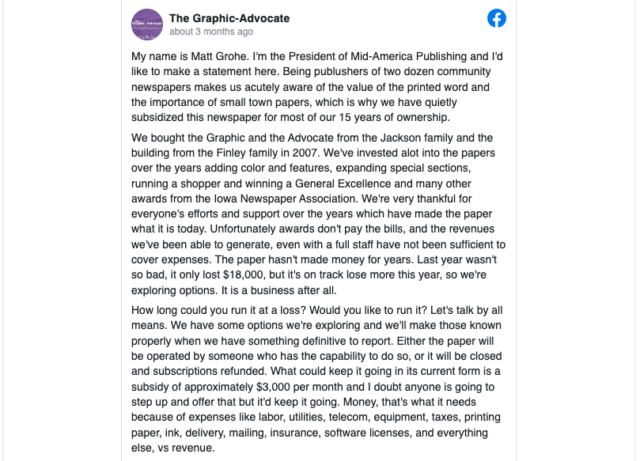
4 Comments on "The Complex (And Petty?) Reason This Small Iowa City Now Has Two Newspapers"
I thought you might be interested in some history of the papers in Calhoun County. My family owned the Lohrville Enterprise, and later the Farnhamville Index and the Churdan Reporter. My grandfather Cecil Easton bought the Enterprise in the 1920’s; in addition to the Enterprise, he also set type for the other papers in the county and delivered them at night. My aunt, who passed just this year at the age of 100, remembered as a preschooler going with him to keep him awake as he drove on mostly gravel roads. She recalled that often she had to wake him up. She could steer but was too short to do the pedals too. They went into the ditch a few times as well! Admittedly he worked too hard, and at the age of 29, passed away likely of a heart attack. Then my grandmother Helen Easton, who had previously worked at the Manson Journal, took the Enterprise over until she retired. The Enterprise needed more subscribers to be qualified to publish the “legals” which even then paid well. So my grandmother went from farm to farm, braving farm dogs and the weather, asking people to subscribe and eventually she got enough subscribers to publish the “legals.” Some tough years followed; the depression; people sometimes paid with eggs, so my grandmother made a deal with the locker for them to buy the eggs that she collected from her. It was hard work always, but it was enough to care for her two daughters and put them through college. My mother Eleanor Mills was the next editor and publisher for some 15-20 years. She sold the paper to the Rockwell City Advocate in the early 70’s citing the free ad sheets as the reason she needed to sell, but likely it was also the changing demographics of the smaller farms disappearing and the population declining. Later both she and my sister Kathy Healy both worked for the Lake City Graphic under the Jackson family’s ownership. Now all the papers, even the larger ones seem to be having new challenges as well as opportunities with the increased use of online media, Facebook and all the rest. I hope it sorts itself out and I wish you luck. I would not want to see the smaller newspapers disappear; people need them. Maybe we just need to return to simpler times. I know I am not interested in reading a newspaper on the internet; I want that paper copy in my hands. Must be all those descendants influencing me!
Julie Mills Helle
Wow, what a tale. Thank you for providing a story I definitely haven’t seen anywhere else.
I wish some enterprising journalists would start a rival to the AMES TRIBUNE and steal the best talent from the TRIB. And then I wish they would give Ames residents something closer to the newspaper they used to have.
I no longer live in Ames, but I read pieces of the TRIB online occasionally. It now seems to be mostly a Mini-Me of the DES MOINES REGISTER, and most of the content seems to come directly from the REG.
That’s kind of sad for a university town that now has (I just checked online) nearly 70,000 people. Especially when the university has, or at least used to have, a respected school of journalism.
I find it suspicious that the Phoenix is working out of the community building (which is city-owned and not without a few controversies this past year), and that the Phoenix seemingly has not covered the lawsuit that the City of Lake City has been dealing with about zoning issues and the Lake City mayor’s business. That seems like a big story that should be covered, unless there is some behind-the-scenes discussions between the Phoenix and the city that has not been made public.
Sure hope The Phoenix bothers to cover more than high school sports. Advocate readership over the past few years declined for a reason. Can’t forget the Great Tree Saga of 2021, either. Hardly ever ran LTEs, especially if they didn’t share the same opinion, but by God, we can spend a month running LTEs bickering over a tree being cut down.